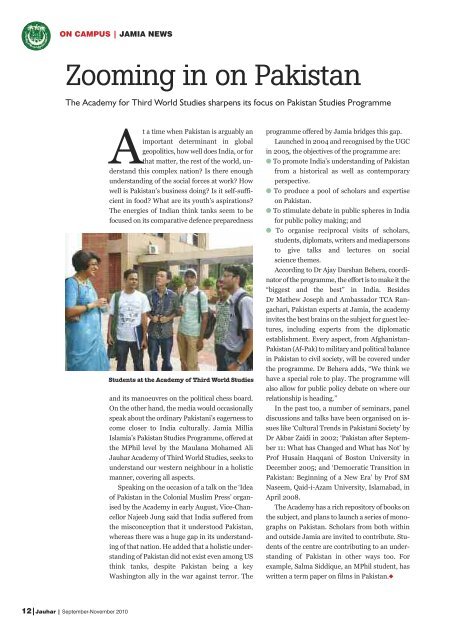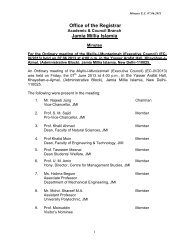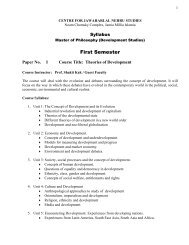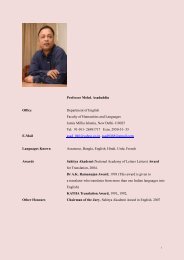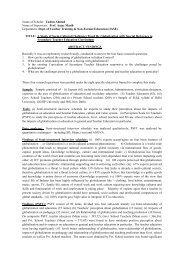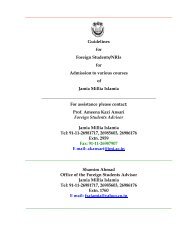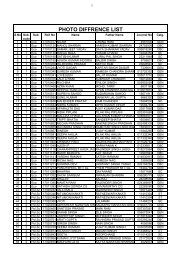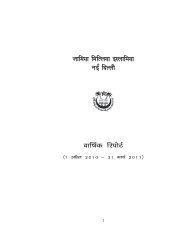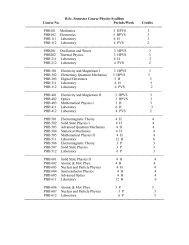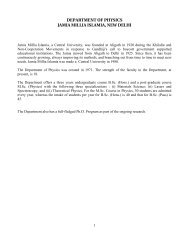Jauhar | September-November 2010 - Jamia Millia Islamia
Jauhar | September-November 2010 - Jamia Millia Islamia
Jauhar | September-November 2010 - Jamia Millia Islamia
Create successful ePaper yourself
Turn your PDF publications into a flip-book with our unique Google optimized e-Paper software.
ON CAMPUS | JAMIA NEWS<br />
Zooming in on Pakistan<br />
The Academy for Third World Studies sharpens its focus on Pakistan Studies Programme<br />
12|<strong>Jauhar</strong> | <strong>September</strong>-<strong>November</strong> <strong>2010</strong><br />
At a time when Pakistan is arguably an<br />
important determinant in global<br />
geopolitics, how well does India, or for<br />
that matter, the rest of the world, understand<br />
this complex nation? Is there enough<br />
understanding of the social forces at work? How<br />
well is Pakistan’s business doing? Is it self-sufficient<br />
in food? What are its youth’s aspirations?<br />
The energies of Indian think tanks seem to be<br />
focused on its comparative defence preparedness<br />
Students at the Academy of Third World Studies<br />
and its manoeuvres on the political chess board.<br />
On the other hand, the media would occasionally<br />
speak about the ordinary Pakistani’s eagerness to<br />
come closer to India culturally. <strong>Jamia</strong> <strong>Millia</strong><br />
<strong>Islamia</strong>’s Pakistan Studies Programme, offered at<br />
the MPhil level by the Maulana Mohamed Ali<br />
<strong>Jauhar</strong> Academy of Third World Studies, seeks to<br />
understand our western neighbour in a holistic<br />
manner, covering all aspects.<br />
Speaking on the occasion of a talk on the ‘Idea<br />
of Pakistan in the Colonial Muslim Press’ organised<br />
by the Academy in early August, Vice-Chancellor<br />
Najeeb Jung said that India suffered from<br />
the misconception that it understood Pakistan,<br />
whereas there was a huge gap in its understanding<br />
of that nation. He added that a holistic understanding<br />
of Pakistan did not exist even among US<br />
think tanks, despite Pakistan being a key<br />
Washington ally in the war against terror. The<br />
programme offered by <strong>Jamia</strong> bridges this gap.<br />
Launched in 2004 and recognised by the UGC<br />
in 2005, the objectives of the programme are:<br />
● To promote India’s understanding of Pakistan<br />
from a historical as well as contemporary<br />
perspective.<br />
● To produce a pool of scholars and expertise<br />
on Pakistan.<br />
● To stimulate debate in public spheres in India<br />
for public policy making; and<br />
● To organise reciprocal visits of scholars,<br />
students, diplomats, writers and mediapersons<br />
to give talks and lectures on social<br />
science themes.<br />
According to Dr Ajay Darshan Behera, coordinator<br />
of the programme, the effort is to make it the<br />
“biggest and the best” in India. Besides<br />
Dr Mathew Joseph and Ambassador TCA Rangachari,<br />
Pakistan experts at <strong>Jamia</strong>, the academy<br />
invites the best brains on the subject for guest lectures,<br />
including experts from the diplomatic<br />
establishment. Every aspect, from Afghanistan-<br />
Pakistan (Af-Pak) to military and political balance<br />
in Pakistan to civil society, will be covered under<br />
the programme. Dr Behera adds, “We think we<br />
have a special role to play. The programme will<br />
also allow for public policy debate on where our<br />
relationship is heading.”<br />
In the past too, a number of seminars, panel<br />
discussions and talks have been organised on issues<br />
like ‘Cultural Trends in Pakistani Society’ by<br />
Dr Akbar Zaidi in 2002; ‘Pakistan after <strong>September</strong><br />
11: What has Changed and What has Not’ by<br />
Prof Husain Haqqani of Boston University in<br />
December 2005; and ‘Democratic Transition in<br />
Pakistan: Beginning of a New Era’ by Prof SM<br />
Naseem, Qaid-i-Azam University, Islamabad, in<br />
April 2008.<br />
The Academy has a rich repository of books on<br />
the subject, and plans to launch a series of monographs<br />
on Pakistan. Scholars from both within<br />
and outside <strong>Jamia</strong> are invited to contribute. Students<br />
of the centre are contributing to an understanding<br />
of Pakistan in other ways too. For<br />
example, Salma Siddique, an MPhil student, has<br />
written a term paper on films in Pakistan.


